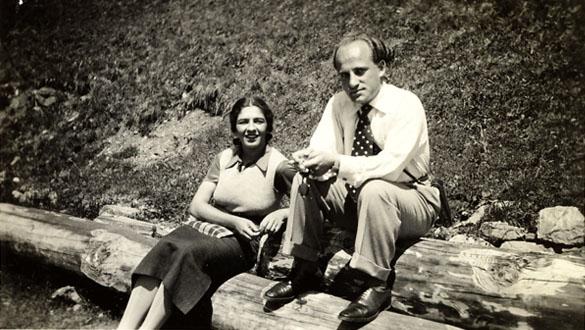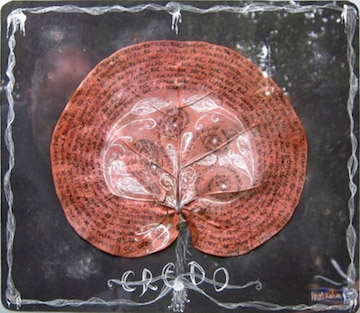The Other Pakistan
by VIOLET SNOW on Aug 25, 2014 • 4:00 pmNo Comments
Dr. Kate and Dr. Hermann Selzer in Rome, 1935
Hazel Kahan was born in Lahore, Pakistan, the daughter of two Jewish physicians who fled Europe in 1937 to escape burgeoning anti-Semitism. Forty years after leaving the city of her youth, Kahan felt compelled to return to Lahore and find the house where she had grown up.
Kahan will narrate “The Other Pakistan,” the story of her parents’ exile, including a five-year camp internment by the British, her life in Lahore, and her going back, complete with photos and film, at the Woodstock Library on Saturday, August 16, at 5 p.m. Her talk will illuminate the cosmopolitan flourishing of Lahore in the 40s and 50s, as well as the efforts of idealistic young professionals who are rebuilding their country after massive flooding in 2010 and 2012.
“Lahore was always my home town, even though I had no normal cultural connections to the place where I was born,” she explained. “But I had a profound emotional attachment. My parents had a thriving medical practice there and a wonderful relationship with the Muslims, who were much more secular than now. They described us as ‘people of the book,’ with no political component, until after [Israel’s] Six-Day War. Suddenly my parents were thought of as Zionist spies, and it became so unpleasant, they had to leave. They went to Israel and died there.”
In 1933, Hitler decreed that Jews were not allowed to study medicine in Germany. Dr. Kate and Dr. Hermann Selzer met in Rome while training for their medical degrees. When the Hitler-Mussolini alliance made a medical practice unfeasible for them in Europe, Hermann went exploring. While visiting what was then British India, he cured a leg infection of the son of a prominent woman in Lahore, and she urged him to set up a clinic in the city. Kate soon joined him, and their practice prospered.
Hazel was born in 1939. Although she spent much of her childhood in boarding schools in England and India, she kept returning to the house in Lahore until the family left, when she was 32. She married and lived in England, Australia, and Israel, obtaining a doctorate in psychology in the U.S.
When her father died in 2007, she read through his voluminous writings. “He had documented our lives,” she recalled. “My mother had kept all my letters from boarding school. I felt an imperative to go back and see if it was what I remembered.”
The visit was fruitful. Her parents’ former clinic had become a cultural institute, where she met two women, Shireen Pasha and Rashida Raza, who were working on a film about Lahore when it was a vibrant cultural center in the years after World War II, echoing its historic role as a fertile crossroads. Kahan provided material about her parents and a voiceover for the short film. She went on to collaborate with the women on a documentary about the flood recovery process in villages around Lahore. Working independently from the government, young architects are helping to rebuild while laying the groundwork for what Kahan calls “an entirely new grass-roots-driven socio-economic system and movement.”
Kahan, who had a successful career in marketing research, now lives on the North Fork of Long Island, where she writes, creates art, and hosts two radio shows on local and international events.
Hazel Kahan will present “The Other Pakistan” on Saturday, August 16, at 5 p.m. at the Woodstock Library, 5 Library Lane. For more information on her work, see http://hazelkahan.com/.



19 Responses
I came across mention of you and your Pakistani life from an email that I received from The Jewish State. I was drawn to the mention of a Jewish life from Pakistan because I am a 3rd generation Brooklyn, NY Jew who has a child with a Pakistani who is Pashtun. When I observed my son’s father and his friends I thought how much they looked like Semitic people with slightly darker complexions. I was wondering if you have any knowledge about anything relating to the Pashtun people or northern Pakistan including Kashmir? I am also a former Long Islander and would love it if I could actually have a real life conversation with you.
Thanks,
Ellen Marshall
East Windsor, N.J.
(609) 443-0869
Let’s talk offline about this.
Hi Hazel,
I am a lahori settled in brooklyn, would love to know when is the next time you will be showing “The Other Pakistan”. This story makes me miss lahore a lot.
./sibté
I don’t have any other talks scheduled for this year but when I do, I will post them on my website or Facebook page.
I understand your longing for Lahore! Lahore Lahore hehy!
Ellen
What you have mentioned is quite an interesting and intriguing. I studied Architecture in Lahore and due to the “quota system”, people from all across Pakistan I should say all corners of Pakistan ended up there.
One of my Pushto speaking friend from Tirah (Tribal Belt) actually started documenting similarities between both the languages, aspects like pronunciation, names of tribes and sub-groups. Though I do not understand either of the languages but we were astonished. Years back an Architect from Yemen whom I was friendly with commented “When I first landed in Pakistan to study what I later got to know as Pushto Language sounded like Hebrew but one that I could not understand”
Even Ghulam Ahmed Qadian mentions this.
This March I drove to Chitral with my wife and kids passing Dir a town that you cross on your way has a Jewish burial site from the mid 1800s and earlier.
And the list goes on.. If they trace the 9 lost tribes in this region it may carry some weight.
Cheers
Dr seltzer cared for me and my two young sons when we lived in Lahore in 1962. To1963 when my husband was purchasing materials for Mangla Dam!
I MENTIONED HIM SEVERAL TIMES IN MY BOOK
“An American Woman in Pakistan . . . Memories of
Mangla Dam” We were one of the few families who lived in Lahore.
How I would love to talk to you and read your work, and your fathers life story
Irene Aylworth Douglass
hy,i want to read your books “The Other Pakistan” and “A House in Lahore”.how and where can i get them..guide me please
Hi Hazel,
Nice photo of your lovely parents. My siblings and myself were born in Lahore, Dr Seltzer cared for my dear sister who suffered with epilepsy. Dr Seltzer was a well known doctor. We were not well off, but my parents some how found the money to take my sister to be treated by your father, and to pay for the medicines. I must try and get hold of your books to read. Colin Brown
Great post. One of the best I’ve come upon.
It’s good to find decent postings like this. I really liked it.
Judging by the amount of comments, this really is undeniably an extremely involved subject. Everytime I return to this post there’s an interesting guest post better than many of the prior ones.
Excellent site content. If only other information I stumbled on was just as exceptional. Keep up the good job.
Dear Ms.Kahan, I was one of the children in the photo that your father took in the internment camp in Purandhar,India. I am the boy all in white in the front row. If you would like I would be available to speak with you at any time. My name is Arthur Wachsler.I plan to purchase your books.Please respond.
How interesting to hear from you. It never fails to amaze me how these childhood memories are always alert to finding others who might remember too. I shall email you offline so you can contact me directly.
The problem with this article or composition is merely the title. It should have been ‘another pakistan’. Regardless, why is there so much negativity towards this face of pakistan? I am sure these ppl work hard to get where they are. If they have the means, they will express it. You cant judge this face of pakistan based on some glossy pics.!
Hi Ms. Hazel ,
My Mother says she was your classmate in Lahore in the convent . Did you attend the Lahore Convent of Jesus & Mary ?
Her name is Aziza Saigol
How nice to hear from you, Shazia. Yes indeed, I was a student at Convent of Jesus & Mary Convent and still have a (not very good) report card to prove it! Although I am of course aware of the Saigon family, I must confess I do not remember your mother Aziza. Please give her my regards nonetheless and thank her for remembering!
Hazel
Hazel: I wrote about your father’s kindness and good care of our family when we lived at WAPDA Flats, Lahore, from 1962 to 1963, then at Mangla. My book, “An American Woman in Pakistan” has had good reviews, and I came to love my life in Lahore. Another friend also knew you and we could so like to talk to you: My website shows contact information.
My mother just told me her mother was treated by a German doctor in Lahore, around 1935-38. How can I find out if it was your respected father?